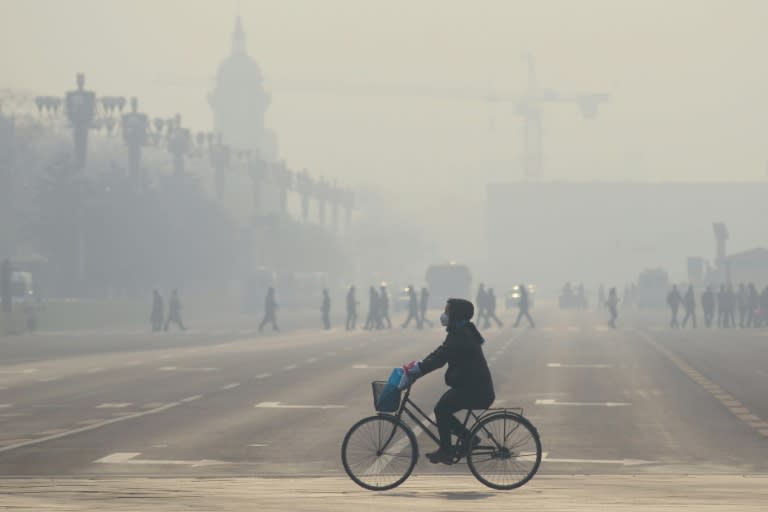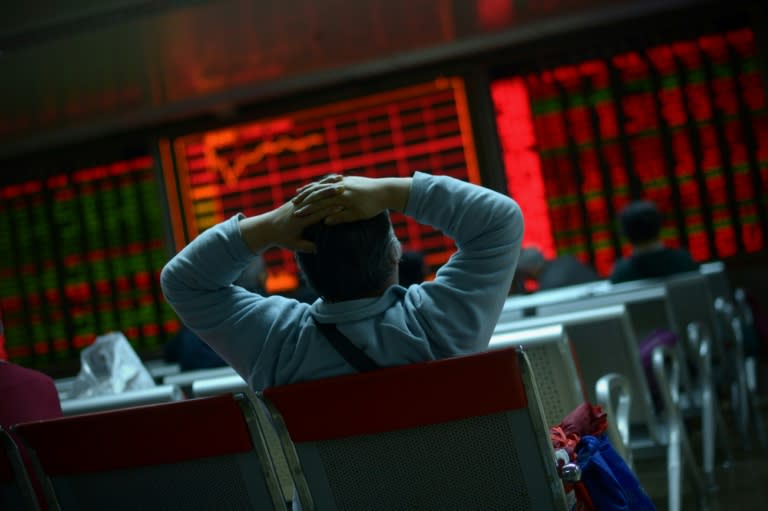Asian markets resume sell-off on lingering China fears
Asian shares tumbled again Monday, with Shanghai plunging over five percent, after more weak data reignited concerns about China's economy following a global stocks rout at the start of the year. After enjoying some minor relief on Friday, the region's bourses were once again in the red as investors dumped equities. Oil prices also headed south, sitting around 12-year lows. Asia's gains at the end of last week failed to reassure US and European markets, which ended in negative territory Friday as a strong US jobs report was overshadowed by fears about China and its leaders' ability to manage a slowdown. "The market is concerned about China’s financial stability," Matthew Sherwood, head of investment strategy at asset managers Perpetual in Sydney, told Bloomberg News. "People are also quite nervous about the Chinese economic outlook. China is certainly slowing on a very gradual path down. A lot of people are fearing a hard landing is in play." On Saturday official figures showed Chinese consumer prices picked up slightly in December but inflation remained about half the government's target. Prices paid at the factory gate, a guide to future inflation, also sank for a 46th consecutive month. The figures are the latest highlighting weakness in China, which is expected to have grown in 2015 at its slowest rate in a quarter of a century. On Monday Shanghai closed down 5.3 percent, while Hong Kong gave up 2.4 percent in late trade. Sydney ended 1.2 percent lower, Seoul slipped 1.2 percent and Singapore was 2.0 percent off. Tokyo was closed for a public holiday. Investors extended losses from last week, which was one of the worst starts to a year on record with dealers rattled after trade was suspended twice in four days in Chinese markets. Shanghai ended the week about 10 percent lower, in echoes of a sell-off that fuelled global turmoil in the summer. - 'Kneecapping' - London lost 5.3 percent over last week, Paris shed 6.5 percent and Frankfurt dropped 8.3 percent. And on Wall Street, the Dow and S&P 500 lost about 6.0 percent, marking the worst opening week of a year in the history of either index. A series of cuts in the yuan currency's value to a five-year low against the dollar added to the sense of nervousness as Beijing stood accused of bungling its handling of the markets. On Friday the central People's Bank of China sought to soothe nerves by pledging "prudent" monetary policy and work to ensure "reasonably abundant liquidity" in the banking system this year. "Chinese equities have had a tough start to the year. This has flowed around the globe, kneecapping equities, where valuations were already deemed to be stretched," said Mark Smith, a senior economist in Auckland at ANZ Bank New Zealand. "A weaker inflation outlook and heightened market volatility has also swung the pendulum back to more policy support." Oil prices continued their slump, with both main global contracts dropping around two percent on Monday. The slowdown in China -- the world's biggest energy user -- fuelled a decline sparked by a worldwide glut, weak demand and a strong dollar. Worries about the global outlook pushed up the price of gold, which is considered a safe investment in times of uncertainty. The precious metal, which is up more than three percent so far this year, bought $1,105 an ounce Monday. - Key figures around 0700 GMT - Shanghai - Composite: DOWN 5.3 percent at 3,016.70 (close) Hong Kong - Hang Seng: DOWN 2.4 percent at 19,967.54 Tokyo - Nikkei 225: Closed for public holiday Euro/dollar: DOWN at $1.0921 from $1.0922 Dollar/yen: DOWN at 117.25 yen from 117.26 yen New York - Dow: DOWN 1.0 percent at 16,346.45 (close) London - FTSE 100: DOWN 0.7 percent at 5,912.44 (close)




